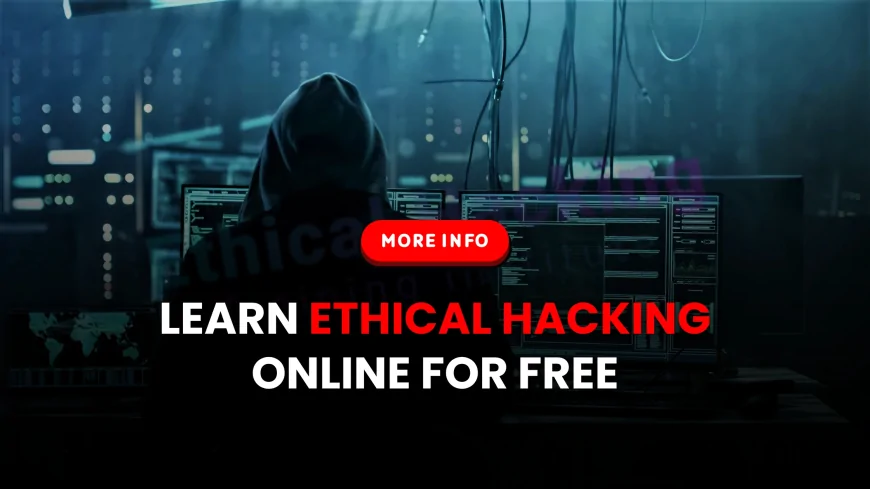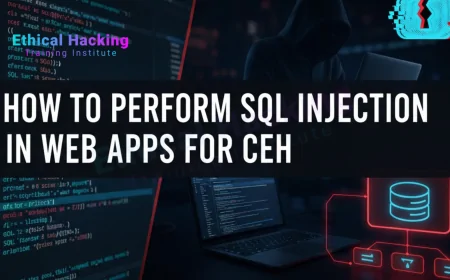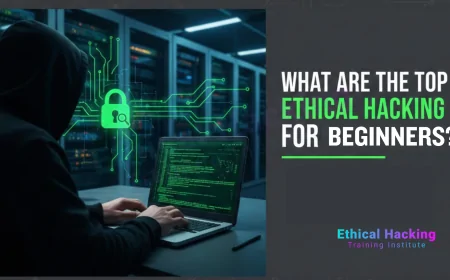Free Hacking Courses Online: Get Started with Ethical Hacking Today | Master the Basics of Hacking with Free Online Training
Explore top free ethical hacking courses online for beginners in 2025. Learn cybersecurity, tools, and hacking skills at zero cost.

Table of Contents
- Introduction
- What is Ethical Hacking?
- Why Learn Ethical Hacking for Free?
- Top Platforms Offering Free Hacking Courses
- Top Free Ethical Hacking Courses in 2025
- Comparison: Free vs Paid Hacking Courses
- Skills You Can Learn in Free Hacking Courses
- Free Tools and Virtual Labs for Practice
- Beginner Roadmap: How to Start Learning Hacking
- Career Opportunities After Learning Ethical Hacking
- FAQs
- Conclusion
Introduction
Are you fascinated by cybersecurity and want to learn hacking the ethical way—without spending a rupee or a dollar? In today's digital age, free ethical hacking courses online make it possible for anyone to begin a career in cybersecurity. Whether you're a student, tech enthusiast, or job seeker, free resources are your first step toward becoming a certified ethical hacker. This guide covers the best free courses, platforms, skills you’ll gain, and how to build a hacking career—absolutely free.
What is Ethical Hacking?
Ethical hacking involves legally breaking into systems to identify and fix vulnerabilities before malicious hackers can exploit them. Ethical hackers, also known as white-hat hackers, use their skills to strengthen cybersecurity defenses in organizations.
Ethical hacking domains include:
- Penetration Testing
- Network Security
- Web Application Security
- Wireless & Mobile Hacking
- Malware Analysis
Why Learn Ethical Hacking for Free?
Learning ethical hacking for free offers several benefits:
- Zero Cost: Perfect for beginners or students without a budget.
- Flexible Learning: Study anytime, anywhere.
- Community Access: Join forums, GitHub projects, and Discord servers.
- Skill Validation: Skill-building through free labs enables learners to showcase their practical cybersecurity expertise.
Top Platforms Offering Free Hacking Courses
The internet offers numerous platforms where you can learn ethical hacking at zero cost. These platforms include self-paced courses, interactive labs, and community support. Below are some of the best free platforms for learning ethical hacking in 2025, including WebAsha:
- WebAsha:WebAsha's platform features accessible cybersecurity training for beginners, including modules on Linux, networking, and ethical hacking.WebAsha provides occasional free workshops, demo classes, and webinars for cybersecurity aspirants. Keep an eye on their event calendar for free offerings.
These platforms offer an excellent opportunity to start learning ethical hacking without spending money, making them perfect for students, beginners, and job seekers looking to upskill in cybersecurity.
Top Free Ethical Hacking Courses in 2025
Here are the best-rated and most comprehensive free ethical hacking courses for 2025:
- WebAsha – Free Ethical Hacking Demo Course: WebAsha Technologies occasionally provides free demo classes, webinars, and beginner workshops in ethical hacking, Linux, and network security. These are conducted by real instructors and offer foundational knowledge for aspirants preparing for CEH, CompTIA Security+, and other certifications.
Comparison: Free vs Paid Hacking Courses
| Criteria | Free Courses | Paid Courses |
|---|---|---|
| Cost | ₹0 / $0 | ₹5,000 to ₹2,00,000 |
| Certificates | Limited or none | Usually included |
| Hands-on Labs | Available (TryHackMe, HTB) | Extensive and guided |
| Job Assistance | No | Often included |
| Depth of Content | Beginner to Intermediate | Beginner to Advanced |
Skills You Can Learn in Free Hacking Courses
With free online courses, you can start mastering essential skills like:
- Linux commands and terminal navigation
- Networking basics: IP, ports, protocols
- Reconnaissance and scanning tools (Nmap, Whois)
- Vulnerability analysis with tools like Nessus
- Web exploitation techniques: XSS, SQLi, CSRF
Free Tools and Virtual Labs for Practice
Here are top free tools and platforms for hands-on hacking:
- Kali Linux: Pre-loaded with ethical hacking tools.
- TryHackMe and HTB: Free labs for real-world simulation.
- OWASP Juice Shop:Serves as a legal playground for hands-on penetration testing and vulnerability assessment.
- Burp Suite Community Edition: For web vulnerability testing.
Beginner Roadmap: How to Start Learning Hacking
Step-by-step roadmap for beginners:
- Learn Networking & Linux basics.
- Understand cybersecurity principles.
- Take beginner courses on TryHackMe or Cybrary.
- Practice labs regularly.
- Join hacking communities and capture-the-flag (CTF) challenges.
- Document your learning via GitHub or blogs.
Career Opportunities After Learning Ethical Hacking
After completing free hacking courses and gaining practical skills, you can explore:
- Junior Penetration Tester
- Security Analyst
- Bug Bounty Hunter
- Cybersecurity Researcher
- Red Team Intern
You may also move forward to certifications like CEH, CompTIA Security+, or OSCP.
Frequently Asked Questions (FAQs)
1. Are free hacking courses really effective?
Yes, many free courses offer hands-on labs and quality content for beginners.
2. Can I become an ethical hacker using only free resources?
Yes, if you stay consistent and gain practical experience with tools and labs.
3. Do free courses provide certificates?
Some do, like Coursera or edX (in audit mode), but most hands-on platforms focus on skills, not certificates.
4. Is it legal to learn hacking online?
Yes, ethical hacking is legal as long as you don’t hack systems without permission.
5. What is the best free course for ethical hacking beginners?
TryHackMe’s “Pre Security” and CyberMentor’s YouTube series are top-rated for beginners.
6. What tools will I learn in free courses?
Tools like Nmap, Burp Suite, Wireshark, Metasploit, and basic scripting in Bash or Python.
7. Is TryHackMe free to use?
Yes, it offers many free learning paths, with an optional paid plan for advanced content.
8. What should I learn first in ethical hacking?
Start with networking, Linux basics, and cybersecurity fundamentals.
9. Can I get a job with only free learning?
Yes, if you build a strong portfolio and demonstrate your skills via labs and bug bounties.
10. Are YouTube hacking courses reliable?
Yes, channels like TheCyberMentor and HackerSploit are trusted and regularly updated.
11. What are capture-the-flag (CTF) challenges?
CTFs are gamified cybersecurity challenges that teach real-world hacking techniques.
12. Do I need to know coding to start hacking?
No, but learning Python or Bash scripting helps a lot as you progress.
13. Can school students take free hacking courses?
Yes, many platforms are beginner-friendly and suitable for high school and college students.
14. What operating system do I need?
Kali Linux or Parrot OS is preferred. You can install them via virtual machines.
15. Are free courses updated regularly?
Yes, top platforms like TryHackMe and Cybrary update their content to reflect real-world threats.
16. How long does it take to learn ethical hacking?
With regular practice, you can become proficient in 6–12 months.
17. Can I earn from bug bounty programs after learning from free courses?
Yes, many successful bounty hunters started with free learning resources.
18. Is hacking a good career in 2025?
Absolutely! Ethical hackers are in high demand with excellent salary prospects.
19. Are free ethical hacking labs safe to use?
Yes, labs from TryHackMe, HTB, and OWASP are legal and safe for learners.
20. What’s the next step after free courses?
Pursue advanced certifications like CEH, eJPT, or OSCP and contribute to open-source security tools.
Conclusion
Free ethical hacking courses have democratized cybersecurity education, enabling anyone to begin their journey without financial barriers. With the right mindset, practical tools, and consistent effort, you can master the foundations of ethical hacking and move toward a rewarding cybersecurity career. In 2025, there's no excuse not to start—because the best things in hacking can still be free.
What's Your Reaction?
 Like
0
Like
0
 Dislike
0
Dislike
0
 Love
0
Love
0
 Funny
0
Funny
0
 Angry
0
Angry
0
 Sad
0
Sad
0
 Wow
0
Wow
0

















